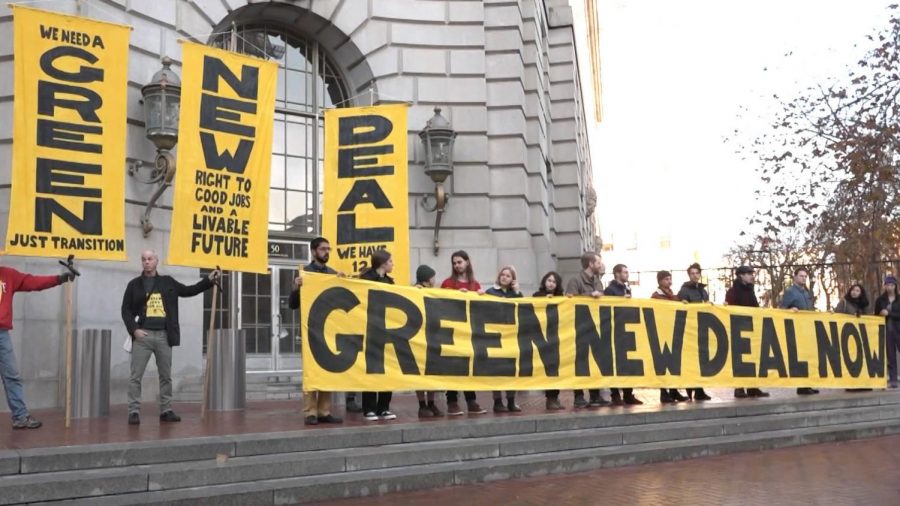Opinion: not embracing progressive policies is political suicide for the Democratic Party
Progressive climate justice group Sunrise Movement protests outside a government building. Photo credit: Sunrise Movement.
As Democrats across the country celebrated President-elect Joe Biden’s victory over Republican incumbent Donald Trump, many overlooked the substantial number of seats lost in the House of Representatives. Although the Democratic Party still has the 218 seats in the House needed for a majority, they lost nine to Republicans, a substantial change from the 2018 midterms in which Democrats flipped 40 seats. In addition, they failed to flip the twelve Republican-held seats that they had hoped to. Since 2018, Democrats’ average margin of victory in Congress has fallen from 38.93 percent to 32.75 percent (calculated with data from ballotpedia). However, no progressives were unseated. In fact, progressives–whose views are farther left of the Democratic Party’s platform, advocating for policies like Medicare for all, climate action and more– across the country, both in national and local elections outperformed many moderate Democrats, many of whom lost their seats.
Many moderate Democrats were quick to blame progressives for House losses, a baseless claim considering that progressives outperformed moderates in Congressional races. In fact, no progressives were unseated. However, blaming progressives for Democratic losses is nothing new. In the 2016 elections, many moderate Democrats blamed progressives for Hillary Clinton’s loss, saying that progressives that supported Bernie Sanders split the party. Recent election cycles have seen Democratic moderates blame progressives for losses, all while public support for progressive policies and candidates has grown.
The group of Congresswomen known as “The Squad” (Alexandria Ocasio-Cortez (NY-14), Ilhan Omar (MN-5), Ayanna Pressley (MA-7) and Rashida Tlaib (MI-13), have often been blamed for scaring moderates away from the Democratic Party. They are some of the loudest progressive voices. All of them easily won re-election this year.
One major issue that has split the Democratic Party over the last five years is the policy of Medicare for All. Moderate Democrats have historically called Medicare for All too radical; President-Elect Joe Biden even went so far as to recently say he would veto it if it was passed by Congress. Although moderates in the Democratic Party see Medicare for All as too radical, the American people overwhelmingly support it. According to the Pew Research Center, 63% of Americans say they think the Federal Government should be responsible for ensuring that all Americans have health insurance. So, if a single-payer health insurance plan isn’t too radical for the American people, who is it too radical for? The main opposition to such programs comes from American medical insurance companies in the United States, which spent $155.5 million dollars lobbying according to Statista. Americans collectively spent $3.6 trillion on healthcare in 2018.
Another major issue causing massive divides in the Democratic Party is the climate crisis. On climate, the discrepancy between moderate Democrats and the general population becomes painfully obvious. Even polling done by conservative media organizations, such as Fox News, shows that the majority of Americans want the federal government to take a strong stance on climate. Policies like the Green New Deal, an ambitious set of plans investing in green infrastructure, have substantial public support, however, the Democratic Party refuses to incorporate the Green New Deal or something similar into the DNC platform. Economists, scientists, environmentalists and activists all agree that the Green New Deal is something that would benefit everyone. Still, the Democratic Party refuses to embrace it for fear of losing access to campaign contributions from big players in the oil industry, such as ExxonMobil, who donated nearly 10 million dollars to political campaigns in 2019 alone. Many powerful figures in the Democratic Party also have large amounts of stock or other investments in oil and gas that they are unwilling to jeopardize, even in the name of saving the planet. Ro Khanna (CA-17), Earl Blumenauer (OR-3), Joe Kennedy (MA-4) and Joe Manchin (WV) all own more than $1 million in fossil fuel stocks. No longer is the Democratic Party the party of the working class. If it was, drastic action would be taken to minimize climate change, which disproportionately displaces, kills, sickens and otherwise affects the working class.
By taking such a moderate stance on these issues, the Democratic Party hopes to draw in swing voters to vote blue. However, as we saw with Democratic House losses in the 2020 election, this strategy isn’t very effective. By pandering to a moderate demographic Democrats lose a huge number of progressive voters who feel underrepresented and therefore don’t go out and vote. As Americas’ younger generations continue to move further left, the Democratic party risks losing the support of a large part of its base. And as existing Democratic voters get older, the party will need to rebuild its base, which cannot be done without the support of America’s younger generations, support which will be much harder to get without adopting progressive policies. Without the support of younger generations, who now make up more than half of the voting-age population, a number which will only grow, the Democratic party will struggle more and more to win races. The solution to this problem is simple: transform the party into a party that represents the people of America, not the corporations.

